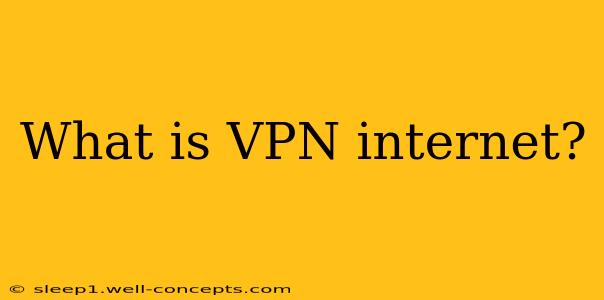The internet, while connecting billions, also exposes us to various online threats. This is where VPN internet comes in, offering a layer of security and privacy that standard internet connections often lack. But what exactly is a VPN, and how does it enhance your online experience? Let's dive in.
Understanding VPN Technology: A Simple Analogy
Imagine you're sending a postcard. Normally, everyone can see the address and message. A VPN is like putting that postcard in a sealed, encrypted envelope. Only the recipient (the website you're visiting) can open it and read the contents. Your internet service provider (ISP) and others can't see what's inside. This protects your data and privacy.
How Does a VPN Work?
A Virtual Private Network (VPN) creates a secure, encrypted connection between your device (computer, phone, tablet) and the internet. Here's a breakdown of the process:
- Connection: You connect to a VPN server provided by your VPN service provider.
- Encryption: Your internet traffic is encrypted, meaning it's scrambled and unreadable to anyone intercepting it.
- Tunneling: This encrypted data travels through an encrypted "tunnel" to the VPN server.
- Server Routing: The VPN server then sends your request to the website or service you're trying to access. The response travels back through the encrypted tunnel to your device.
Key Benefits of Using a VPN for Internet Access
Using a VPN offers several crucial benefits:
Enhanced Online Privacy
- Masks your IP address: Your IP address reveals your approximate location. A VPN masks your real IP address, replacing it with the IP address of the VPN server. This makes it harder for websites and advertisers to track your online activity.
- Protects against data breaches: Encrypted VPN connections make it significantly more difficult for hackers to intercept your data.
- Keeps your browsing history private: Your ISP and others can't see the websites you visit when using a VPN.
Improved Online Security
- Secures public Wi-Fi: Public Wi-Fi networks are notoriously insecure. A VPN encrypts your connection, protecting your data even on unsecured networks.
- Bypasses geographical restrictions: Some websites and streaming services are only available in certain countries. A VPN can mask your location, allowing you to access content that's otherwise unavailable.
- Protects against malware and phishing attacks: While not foolproof, a VPN adds an extra layer of security against these threats.
Additional Advantages
- Increased anonymity: A VPN contributes to a higher level of online anonymity, making it more difficult to identify you personally.
- Enhanced streaming experience: A VPN can provide faster streaming speeds by choosing a server closer to the streaming service's servers.
Choosing the Right VPN
With numerous VPN providers available, selecting the right one is crucial. Consider these factors:
- Security features: Look for strong encryption protocols (like AES-256) and a strict no-logs policy.
- Server locations: A wider range of server locations provides greater flexibility and access to more content.
- Speed and performance: A reliable VPN shouldn't significantly slow down your internet speed.
- Customer support: Reliable customer support is essential if you encounter any issues.
VPN Internet: A Necessary Tool for the Modern Age
In today's digitally connected world, VPN internet isn't just a luxury—it's becoming a necessity for those who value their online privacy and security. By understanding how VPNs work and choosing a reputable provider, you can significantly enhance your online experience and protect yourself from various online threats. Remember to always research and choose a VPN service that aligns with your specific needs and priorities.

